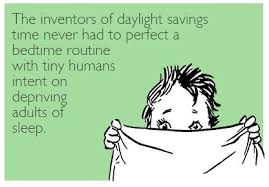
The daylight-saving time change will force most of us to spring forward and advance our clocks one hour. This effectively moves an hour of daylight from the morning to the evening, giving us those long summer nights. But waking up Monday morning may not be so easy, having lost an hour of precious sleep and perhaps driving to work in the dark with an extra jolt of java.
How time changes actually affect you depends on your own personal health, sleep habits, and lifestyle.
Moving our clocks in either direction changes the principal time cue — light — for setting and resetting our 24-hour natural cycle, or circadian rhythm. In doing so, our internal clock becomes out of sync or mismatched with our current day-night cycle. How well we adapt to this depends on several things.
In general, “losing” an hour in the spring is more difficult to adjust to than “gaining” an hour in the fall. It is similar to airplane travel; traveling east we lose time.
An “earlier” bedtime may cause difficulty falling asleep and increased wakefulness during the early part of the night. Going west, we fall asleep easily but may have a difficult time waking.
How long will it take you to adapt to time changes? Though a bit simplistic, a rule of thumb is that it takes about one day to adjust for each hour of time change. There is significant individual variation, however.
How will you feel during this transition? If you are getting seven to eight hours of sound sleep and go to bed a little early the night before, you may wake up feeling refreshed. If you are sleep-deprived already, getting by on six hours, you’re probably in a bit of trouble, especially if you consume alcohol or caffeine close to bedtime. In this situation, you may well experience the decrements of performance, concentration, and memory common to sleep-deprived individuals, as well as fatigue and daytime sleepiness.
What can you do to reset your internal clock to adapt more quickly to the time changes? Your circadian rhythm is internally generated but is influenced by the environment, behavior, and medications.
- As mentioned, light is the principal environmental cue. Light suppresses the secretion of the sleep-inducing substance melatonin. So it is important to expose yourself to the light during the waking hours as much as possible, and conversely, do not expose yourself to bright light when it is dark outside. For example, if you get up at night to go to the bathroom, do not turn on the light. Prepare beforehand by installing a night light. Interestingly, specifically timed light therapy may either advance or delay your sleep cycle, depending on when it is delivered.
- Sleep hygiene is a term used to describe those actions you can take to create sleep-friendly environments and enhance your chances of falling asleep, staying asleep, and sleeping soundly. Basic sleep hygiene includes reducing or eliminating caffeine and alcohol, exercising several hours before bedtime, creating calming rituals before bed to gradually relax yourself (taking a hot bath for example), and wearing ear plugs and eye masks, to name a few. Also important is going to bed and rising at the same time every day. Though there is no evidence that certain diets will actually influence your circadian rhythm, carbohydrates tend to make it easier to fall sleep.
- It is unlikely that medications would be needed for a simple one-hour time change of the clock, but in certain circumstances, like traveling across multiple time zones, hypnotic drugs like bendodiazepines may be used. Their indication is primarily to induce sleep when desired, to get on a new schedule. Given their potential for addiction and that they can negatively affect the quality of sleep, they should only be used under the direct guidance of a doctor or sleep specialist.
So there may be some tired and groggy people hitting the streets Monday morning, in the dark. Interestingly, some studies show an overall reduction in traffic accidents and fatalities due to daylight-saving time changes. However, one study showed a significant increase in accident rates on the Monday following daylight-saving time.
The author attributed sleepiness as a cause. I am not sure exactly which way to go on this one, but maybe you may want to just sit back and have another cup of coffee — decaf, of course — and go in to work a bit later, when the sun is up?
Fast facts about daylight saving time
Hospitals report an average 25 percent spike in heart attack visits the day after we lose an hour in the spring.
It’s just the reverse in the fall — a 12 percent drop the day after.
Here are some survival tips:
Alcohol can interfere with your sleep, so avoid using it for four to six hours before bedtime. Same with caffeine — so only drink decaf coffee.

Prepare for the change Sunday by sleeping earlier. You go to bed 15 minutes earlier, probably a month before we start switching time. (Too late for this one. Maybe next year!?)
And if you think positively, the extra light will give you more time to exercise… for instance jogging.
Tick tock tick tock …
Sleep tight.
At least until Sunday morning. If your sleep issues happen more than twice a year when we spring forward and fall back, you need to call Alaska Sleep Clinic for your FREE sleep assessment!











